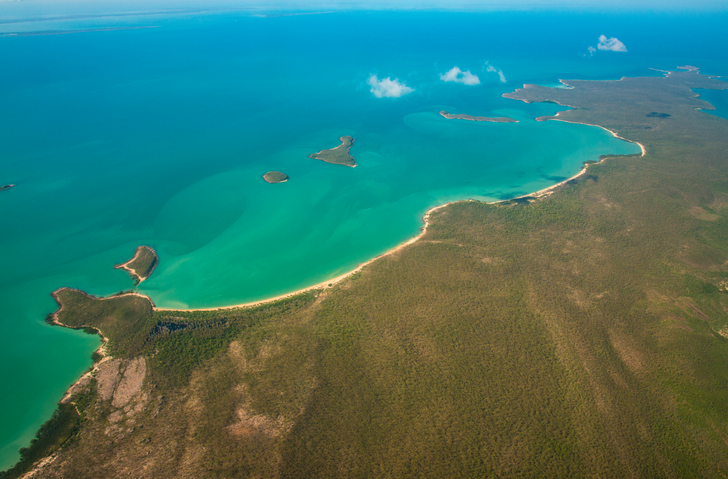
The Australian continent is in an excellent position when it comes to launching payloads into space, because its north is so close to the equator. Only Kourou in French Guiana—the European Space Agency’s main launch site—at 5 degrees north latitude and the Alcantara launch centre in Brazil at 2° south latitude (inoperative after a devastating accident in 2003) are closer to the equatorial sweet spot.
It’s Rocket Science 101 that launching close to the equator on an eastern trajectory provides a ‘ΔV’ (‘delta-V’) advantage that gives a rocket a boost in energy from the earth’s rotation from west to east. That translates into either fewer dollars per kilogram or more kilograms per dollar to launch a payload into low-earth orbit (LEO) compared with launch sites at a higher latitude, such as Cape Kennedy in Florida.
The Arnhem Space Centre near Nhulunbuy in the Northern Territory that’s being established by Australian company Equatorial Launch Australia (ELA) is designed to exploit this natural advantage. The site is at latitude 12° south of the equator, and is one of two launch sites to be developed in Australia (the other is operated by Southern Launch at Whalers Way in South Australia, which will be ideal for launching satellites into sun-synchronous orbit).
Nhulunbuy is perfectly placed to deploy small satellites into equatorial LEO at latitudes between 15° south and north of the equator, as well as into all other orbits. The equatorial LEO orbital region will be crucial for supporting the needs of Southeast Asian and Pacific nations and the rapidly developing economies in Africa and South America. Altogether, that’s a market of around 3 billion people, all of whom will need access to satellite capabilities.
For Australia, equatorial LEO is one of the best locations in space for observing our maritime and air approaches and monitoring sea lanes of communication. The requirement for high revisit rates in those missions implies the use of many satellites for tasks such as maritime surveillance. The Nhulunbuy site would need to be available for nearly constant use to launch satellites, update deployed constellations of satellites and expand surveillance capability.
That’s also good news for Australian providers of launch vehicle such as Gilmour Space and Black Sky Aerospace, as well as companies like Hypersonix that are working on sovereign launch capabilities.
The establishment of space launch sites in Australia, and the growth of launch vehicle providers, will mean the end of our dependency on foreign launch providers. Australia will become self-sufficient in assuring space capability for both civil and military requirements. We’ll no longer be at the mercy of long launch schedules with foreign space launch companies. Instead, Australia will be able to enter a potentially lucrative global launch market driven by the rapid growth of satellite megaconstellations in the 2020s. For defence purposes, it means we’ll be able to provide assured space support for the Australian Defence Force and to burden-share with key allies.
A sovereign launch capability will enable Australia to exploit the advantage of the falling cost of space launch, particularly as more commercial launch providers develop reusable rocket systems. Australia is well placed to build its own small satellites and cubesats, and exploit ‘fourth industrial revolution’ manufacturing technologies to constantly update its space capabilities through spiral development. We’ll also be able to build satellites to order for foreign customers, and thus develop a space export industry alongside a domestic one.
The Northern Territory is set to play a crucial role in this future. Although the Australian Space Agency will be headquartered in Adelaide, and a concentration of space industry players will emerge in South Australia, key elements of that industry should also emerge in the NT, and be located close to the Nhulunbuy launch site. In particular, launch vehicle integration and test facilities need to be established close to the launch site. It’s not too far a stretch to envisage a satellite manufacturing industry emerging in Darwin that exploits robotic production lines and 3D printing as well as synthetic design techniques to rapidly design, test and produce small satellite and cubesat constellations. Co-locating space industry with space launch sites would stimulate the NT’s high-tech sector.
The ELA launch site at Nhulunbuy could also offer launch services to overseas partners. Key defence partners such as the US, Japan and Southeast Asian states could conceivably launch payloads from Nhulunbuy on their own launch vehicles, and ELA recently signed an agreement with NASA to launch sounding rockets from the launch site in 2020. Looking ahead, it’s quite possible that reusable vehicles launched from elsewhere on the planet could be recovered and then prepared for a new mission launched from Nhulunbuy. With SpaceX now regularly recovering the first stages of its Falcon 9 and Falcon Heavy boosters, and with plans to fully reuse the ‘Starship Super Heavy’ launch vehicle, Nhulunbuy doesn’t need to be limited to small launch vehicles either.
The opportunities for growth are clear, especially if the NT can promote the launch site as a beginning of a new ‘space coast’ that international partners can support. That would also further stimulate the growth of the Territory’s economy beyond the space sector. The emergence of space launch from the NT will create jobs for the local population and, crucially, open up employment opportunities for Indigenous Australians in a vital new high-tech sector of the Australian economy. There’s also considerable potential to grow science, technology, engineering and maths, or STEM, programs in secondary and tertiary education.
The Australian Space Agency recently updated regulatory structures for space launches to make it easier and more cost-effective to send payloads into space from Australian sites. Both the Nhulunbuy and Whaler’s Way sites are well placed to take advantage of this change to become key centres of space activity in the next decade in a way that utterly transforms Australia’s role in space at a global level.

